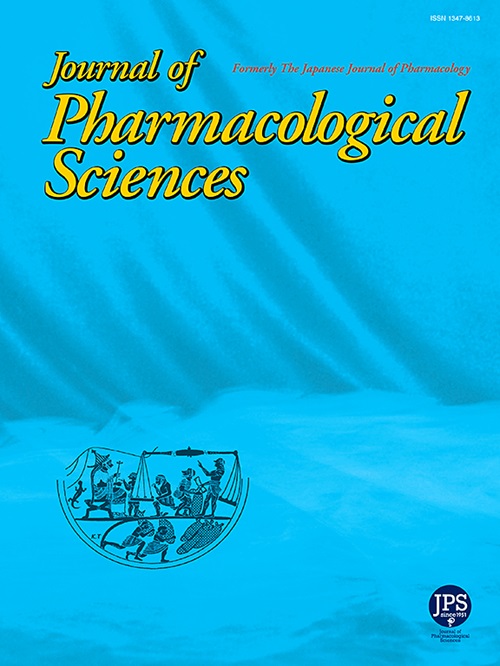Rosamultin attenuates cerebral ischemia/reperfusion injury by inhibiting autophagy via the PI3K/Akt/mTOR pathway
IF 2.9
3区 医学
Q2 PHARMACOLOGY & PHARMACY
引用次数: 0
Abstract
Rosamultin (Rosa), a natural small-molecule compound, is known for its protective activity against hypoxia-induced injury, but its role in cerebral ischemic stroke injury remains unclear. To assess Rosa's effects on cerebral ischemic stroke, the intraluminal filament method was used to construct the middle cerebral artery occlusion and reperfusion (MCAO) in vivo model with 1 h occlusion and 48 h reperfusion. In addition, an oxygen-glucose deprivation and reoxygenation (OGD/R) in vitro model was constructed using HT22 cells. The protective role and underlying mechanism of Rosa on cell injury was also determined in vivo and in vitro. Rosa notably inhibited neurological deficits and diminished infarct volume and neuronal apoptosis in mice exposed to MCAO. Rosa also exerted neuroprotection in the OGD/R model by improving cell viability, decreasing apoptosis, and enhancing the p-Akt and p-mTOR levels. However, LY294002, a PI3K inhibitor, restored the beneficial influences of Rosa after OGD/R. Moreover, Rosa treatment inhibited autophagy levels, and LY294002 partially restored the inhibition of autophagy levels caused by Rosa in the OGD/R model. In addition, Rosa enhanced the p-Akt and p-mTOR levels and inhibited autophagy levels in mice after MCAO. Rosa could attenuate autophagy via activating the PI3K/Akt/mTOR axis, thereby alleviating cerebral ischemia stroke injury.
Rosamultin通过PI3K/Akt/mTOR通路抑制自噬,减轻脑缺血/再灌注损伤
罗莎(Rosa)是一种天然的小分子化合物,因其对缺氧损伤的保护作用而闻名,但其在缺血性脑卒中损伤中的作用尚不清楚。为了评估Rosa对缺血性脑卒中的作用,采用腔内纤维法构建大脑中动脉闭塞再灌注(MCAO)体内模型,闭塞1 h,再灌注48 h。以HT22细胞为材料,建立体外氧葡萄糖剥夺再氧化(OGD/R)模型。在体内和体外实验中,研究了玫瑰提取物对细胞损伤的保护作用及其机制。Rosa显著抑制MCAO小鼠的神经功能缺损,减少梗死体积和神经元凋亡。在OGD/R模型中,Rosa还通过提高细胞活力、减少细胞凋亡、提高p-Akt和p-mTOR水平发挥神经保护作用。然而,PI3K抑制剂LY294002在OGD/R后恢复了Rosa的有益影响。此外,在OGD/R模型中,Rosa处理抑制了自噬水平,LY294002部分恢复了Rosa对自噬水平的抑制。此外,Rosa还能提高MCAO后小鼠的p-Akt和p-mTOR水平,抑制自噬水平。Rosa可以通过激活PI3K/Akt/mTOR轴来减弱自噬,从而减轻脑缺血卒中损伤。
本文章由计算机程序翻译,如有差异,请以英文原文为准。
求助全文
约1分钟内获得全文
求助全文
来源期刊
CiteScore
6.20
自引率
2.90%
发文量
104
审稿时长
31 days
期刊介绍:
Journal of Pharmacological Sciences (JPS) is an international open access journal intended for the advancement of pharmacological sciences in the world. The Journal welcomes submissions in all fields of experimental and clinical pharmacology, including neuroscience, and biochemical, cellular, and molecular pharmacology for publication as Reviews, Full Papers or Short Communications. Short Communications are short research article intended to provide novel and exciting pharmacological findings. Manuscripts concerning descriptive case reports, pharmacokinetic and pharmacodynamic studies without pharmacological mechanism and dose-response determinations are not acceptable and will be rejected without peer review. The ethnopharmacological studies are also out of the scope of this journal. Furthermore, JPS does not publish work on the actions of biological extracts unknown chemical composition.

 求助内容:
求助内容: 应助结果提醒方式:
应助结果提醒方式:


